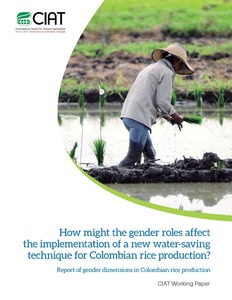How might the gender roles affect the implementation of a new water-saving technique for Colombian rice production? : Report of gender dimensions in Colombian rice production
Globally, rice cultivation is responsible for 10% of greenhouse gas emissions released by agricultural activities. To sustainably reduce the contribution of rice to greenhouse gas (GHG) emissions, it is important to pursue management and technological options that reduce emissions and improve farmer productivity, adaptation and resilience to climate change impacts. Alternate wetting and drying (AWD) is a water-saving technique that helps farmers adapt to less water availability. It reduces the amount of in-field gas emissions associated with rice production, and it may increase and/or maintain rice productivity levels. The International Center for Tropical Agriculture (CIAT) and partners are conducting several studies to evaluate the feasibility of implementing this technology in Colombia, a country that has committed to reducing economy-wide GHG emissions by 20% under the 2015 Paris Agreement and implementing adaptation plans by 2030. The sustainable implementation of AWD requires an understanding of the economic, climatic, political, agronomic and social considerations within which farmers operate. The literature shows how gender roles can influence the adoption of a technology or be affected by the introduction of a new technology. A baseline study was designed to answer the following questions: how might gender impact the adoption of AWD in Colombia? And how will the adoption of AWD affect the gender division of labor? A household survey with sex-disaggregated information in 609 households in five departments was conducted. The results suggest that women own rice assets and make decisions about production but are not recognized as rice producers. They do not receive agricultural information and do not have group membership in the same proportion as men do. Furthermore, households in which women participate as producers are more likely to have noneconomic incentives and water availability (i.e. no problems with water scarcity) to implement AWD. Women participate in manual weed control as hired labor and men participate more in irrigation, and both activities can be affected by the implementation of AWD. For AWD to be widely implemented in Colombia, it is important to target women as well as men and create awareness of the possible social effects of the technology in gendered labor activities, and therefore in the lives of both women and men.

